选择性必修第一册 Unit2 Success Lesson3 Getting to the Top 精品课堂 (5)(共62张PPT)
文档属性
| 名称 | 选择性必修第一册 Unit2 Success Lesson3 Getting to the Top 精品课堂 (5)(共62张PPT) | 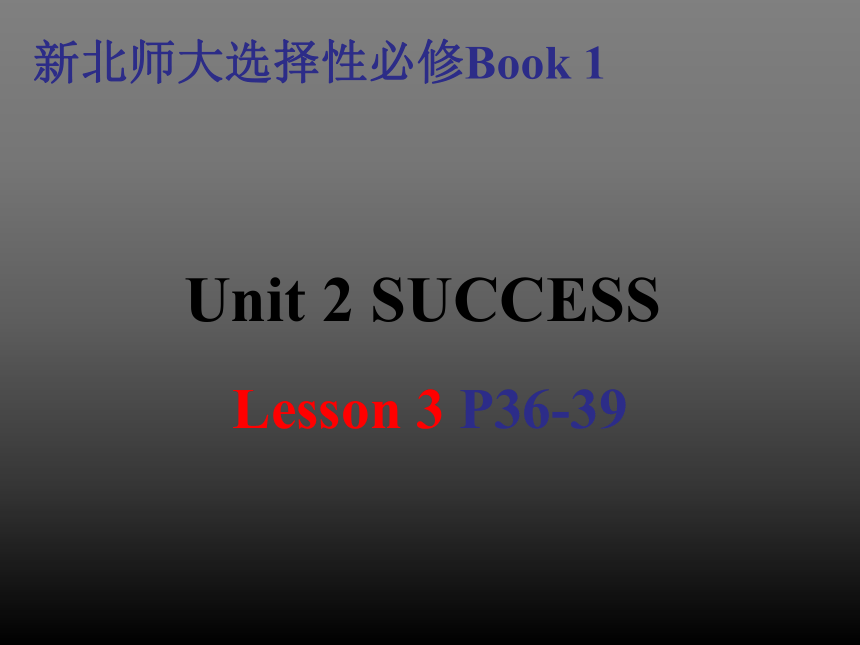 | |
| 格式 | pptx | ||
| 文件大小 | 841.4KB | ||
| 资源类型 | 教案 | ||
| 版本资源 | 北师大版(2019) | ||
| 科目 | 英语 | ||
| 更新时间 | 2023-03-17 10:57:19 | ||
图片预览

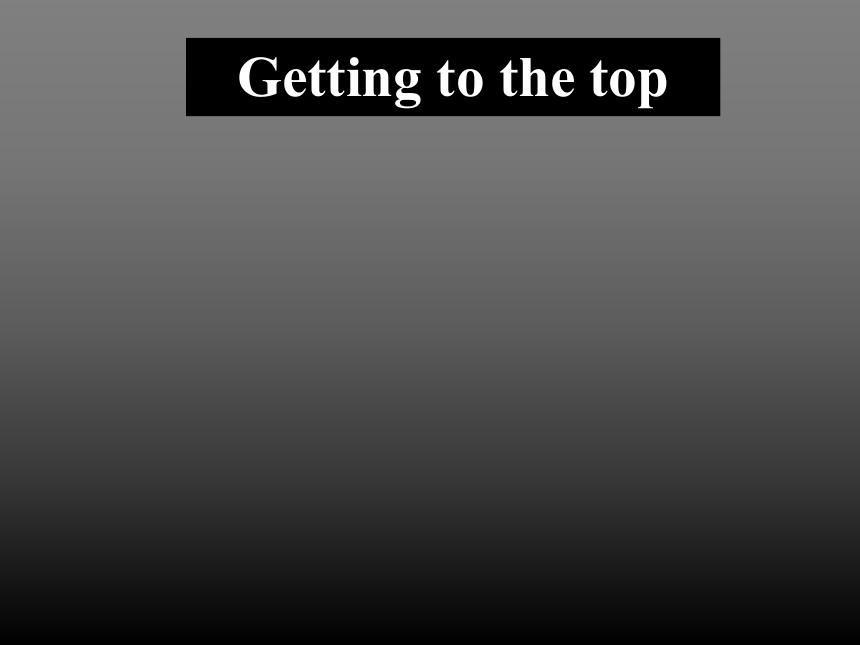
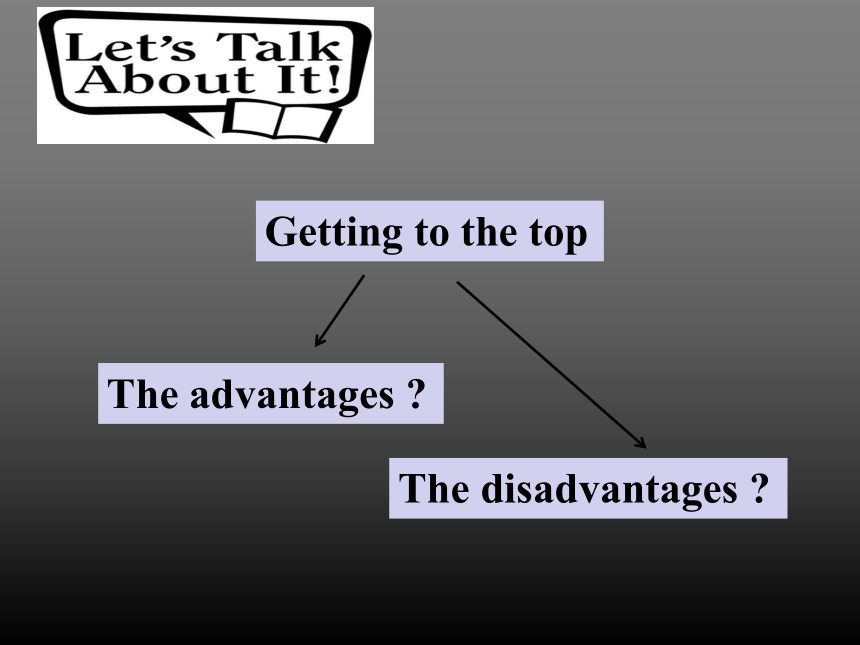


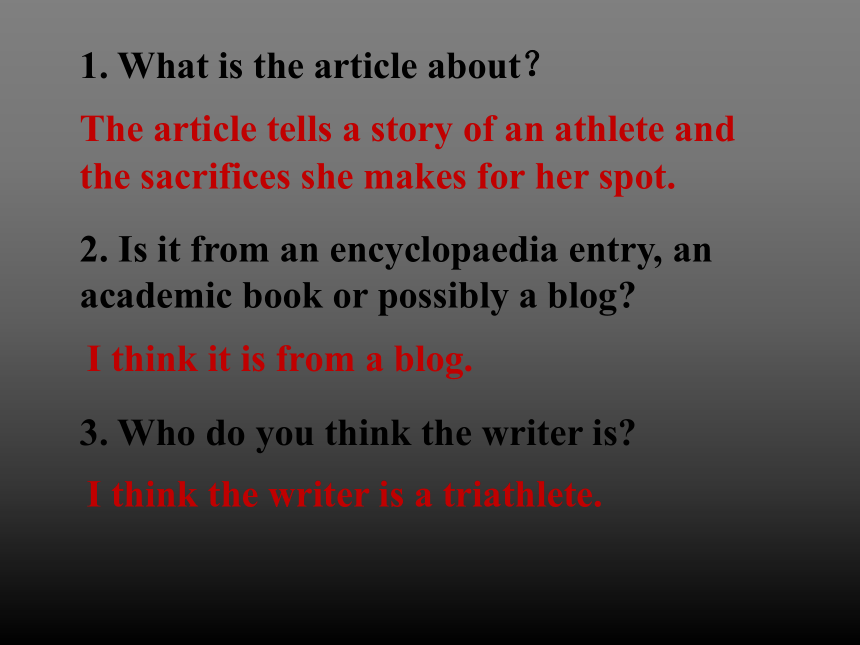
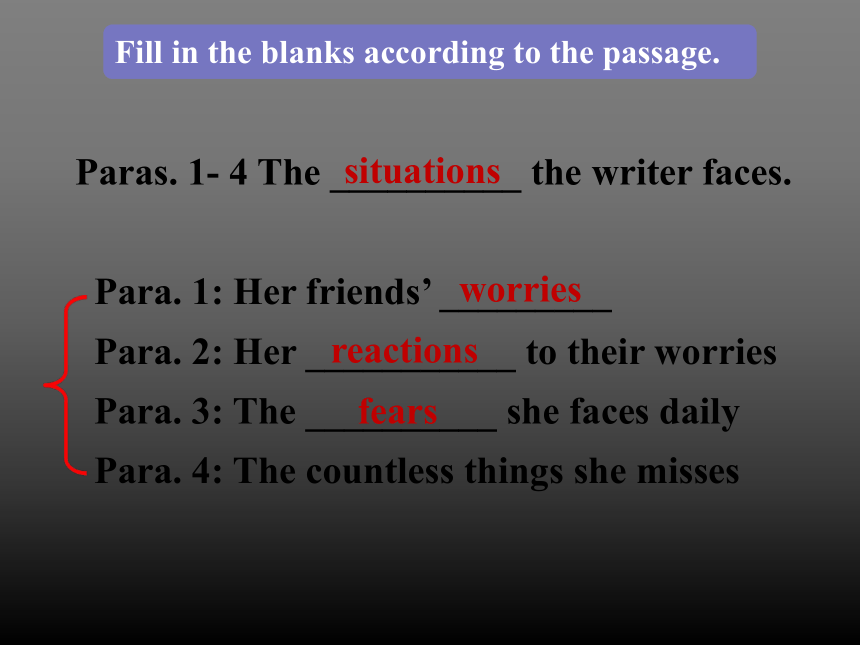
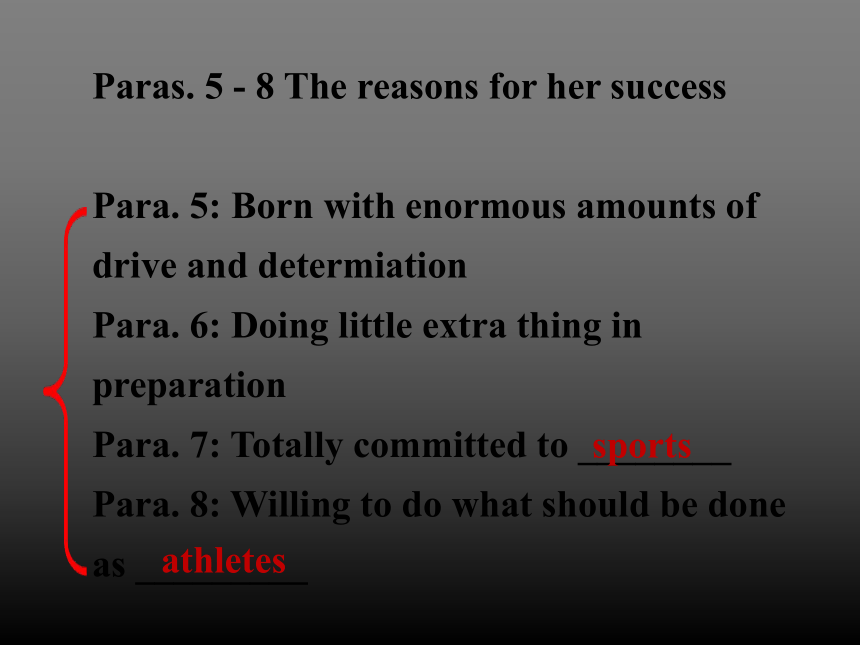
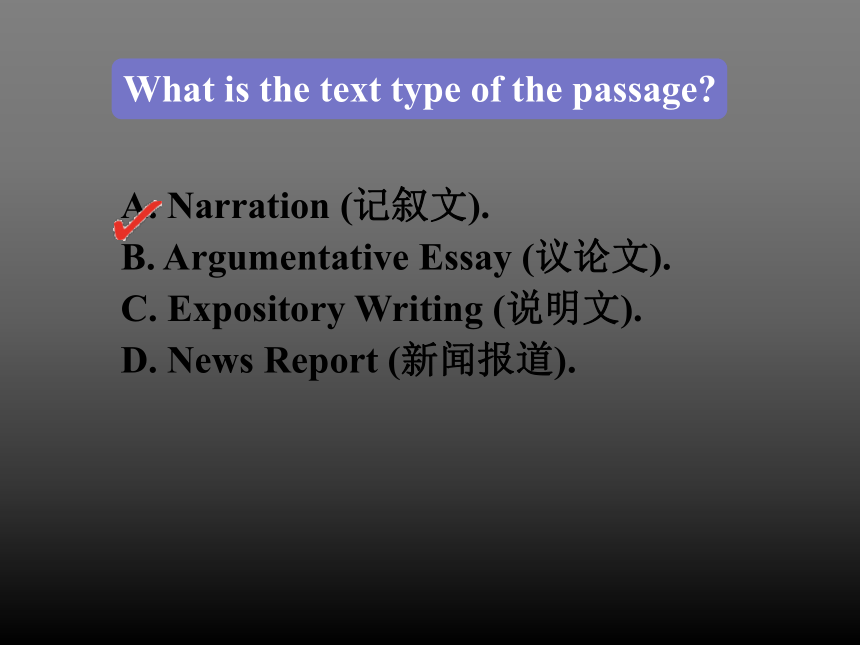
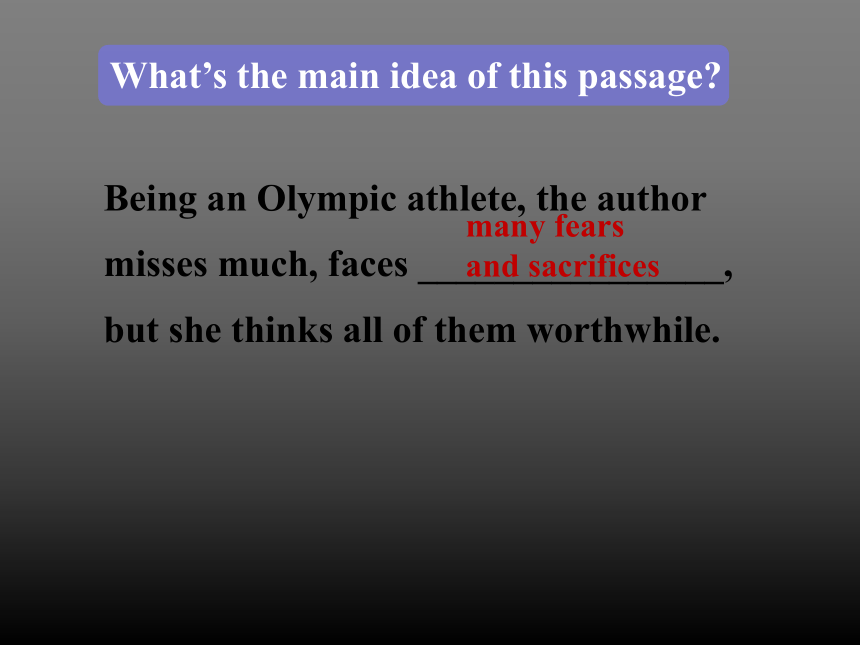

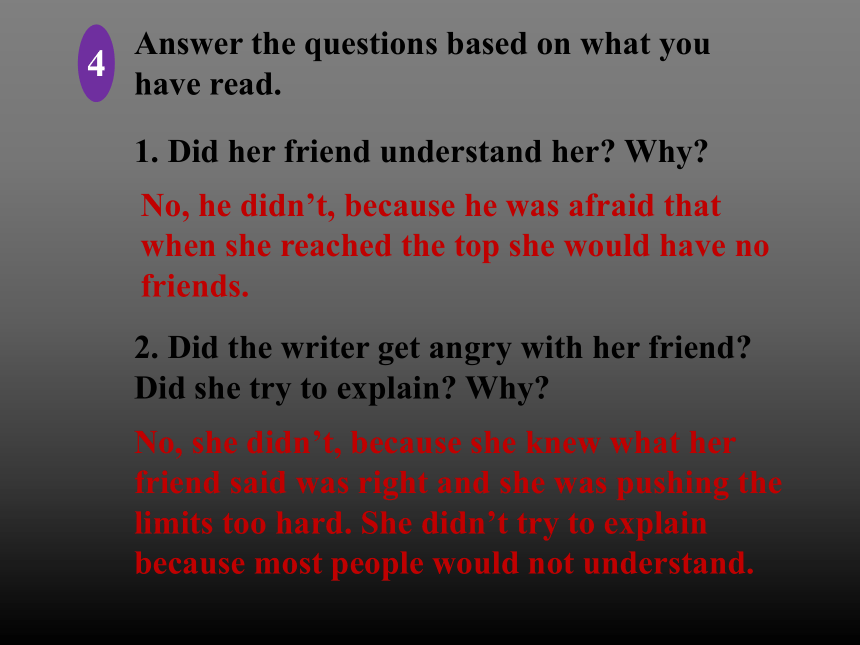
文档简介
(共62张PPT)
Lesson 3 P36-39
新北师大选择性必修Book 1
Unit 2 SUCCESS
Getting to the top
Getting to the top
The advantages
The disadvantages
1
Pair Work. Discuss the questions. Use the phrases below to help you.
1. Which athlete do you admire most Why
2. What did they do to get to the top of the sport
to push oneself to the limits
to give up everything for the sport
to live one’s life to extremes
to be willing to do the extra little bit
to be totally focused on the sport
to strive for greatness
2
Read the article quickly. Answer the questions.
1. What is the article about?
2. Is it from an encyclopaedia entry, an academic book or possibly a blog
3. Who do you think the writer is
The article tells a story of an athlete and the sacrifices she makes for her spot.
I think it is from a blog.
I think the writer is a triathlete.
Fill in the blanks according to the passage.
Paras. 1- 4 The __________ the writer faces.
Para. 1: Her friends’ _________
Para. 2: Her ___________ to their worries
Para. 3: The __________ she faces daily
Para. 4: The countless things she misses
situations
worries
reactions
fears
Paras. 5 - 8 The reasons for her success
Para. 5: Born with enormous amounts of drive and determiation
Para. 6: Doing little extra thing in preparation
Para. 7: Totally committed to ________
Para. 8: Willing to do what should be done as _________
sports
athletes
What is the text type of the passage
A. Narration (记叙文).
B. Argumentative Essay (议论文).
C. Expository Writing (说明文).
D. News Report (新闻报道).
What’s the main idea of this passage
Being an Olympic athlete, the author misses much, faces ________________, but she thinks all of them worthwhile.
many fears and sacrifices
3
Read paragraphs 1-4. Complete the information in the table. Then describe the writer’s situation to your partner.
The situation the writer faces Things she gives up as an Olympic athlete
Her friends’ worries and her reactions
The fears she faces on a daily basis
Birthday parties, family holidays, nights out
She will lose her friends;
She knew they were right.
Whether she is pushing the limits too much;
whether she is being selfish.
4
Answer the questions based on what you have read.
1. Did her friend understand her Why
No, he didn’t, because he was afraid that when she reached the top she would have no friends.
2. Did the writer get angry with her friend Did she try to explain Why
No, she didn’t, because she knew what her friend said was right and she was pushing the limits too hard. She didn’t try to explain because most people would not understand.
3. Was she clear about why she had chosen to be an athlete How do you know
Yes, she was. From the description of her sacrifice we could know she is a “go-getter” with an enormous amount of drive and determination to be the best. We can see that through her descrpitions such as “running a family holiday because of the endless search for a swimming pool to train in”, “almost missed my brother’s wedding because I was busy hiring a car and driving through the ‘no go’ area in order to do a group ride with the local triathletes.”
5
Read paragraphs 5-8. Identify the reasons why the writer was able to get to the top. Use a diagram to illustrate and talk about your analysis.
Reasons:
get ahead on class work rather than go out and play
get the bus on her own at ten years old
go to swim 100 lengths of the pool while other kids played pool games
the only girl in a rugby club of 250 boys
6
Read the article again. What do the phrases or sentence refer to in the article
a very good reason (line 3)
on a day-to-day basis (line 12)
The list is endless (line 19)
an enormous amount of drive and determination (line 20)
three or four outstanding years of winning stuff (line 37-38)
Answers:
“A very good reason” refers that “it takes a lot to be at the top”. “On a day-to-day basis” refers to every day. “The list is endless” refers to “countless birthday parties and nights out I have missed, ruining a family holiday in France because of the endless search for swimming pool to train in, almost missing my brother’s wedding because I was too busy hiring a car in downtown Johannesburg and driving through the ‘no-go’ araes in order to do a group ride with the local triathletes.”
“An enormous amount of drive and determination” refers that “from a small girl, I would stay in at lunch time just to get ahead on class work rather than go out and play; I would get the bus on my own at ten years old and go to swim 100 lengths of the pool while other kids played pool games; I was the only girl in a rugby club of 250 boys. I have always lived my life to extremes.” “Three or four outstanding years of winning stuff” refers that “if your dream is to be the best and reach the winner’s platform, You had better be totally committed to your sport.”
7
Which statements do you think are true according to the article Why
Identifying Real Information
Sometimes, a task may contain questions with unreliable information or in accurate interpretation. It is important to know how to identify what information is accurate (true) and what is inaccurate (false).
Read the text to get the general idea.
Then read the questions / statements and identify important words.
Find the relevant part of the text and identify the important words.
Decide if the important words in the questions / statements and the text express the same idea.
Skill Builder
1. The writer is a professional triathlete. ( )
2. Her first sport was rugby.
3. At first, she was afraid to join the rugby club because it had 250 boys.
Because the writer says “These are the fears I face as a professional athlete on a day-to-day basis.” And she also mentions swimming and riding.
4. She missed many birthday parties, ruined family holidays and skipped nights out for the sport she devoted herself to. ( )
5. What makes an Olympic champion stand out from other competitors is the special talent she or he has.
Because the writer says “I miss birthday parties, ruin family holidays and skip nights out” and “missing my brother’s wedding...in order to do a group ride with the local triathletes”.
6. Although she knows that her way of life is unbalanced or unhealthy, she is determined to continue. ( )
Because we can see from “It is certainly not a balanced way to live and it is certainly not normal but those words are generally not used for anyone who is striving for greatness.”
8
Group Work. Think and share.
1. What are the three most important reasons why the writer was able to get to the top
The first important reason is that she was born with a enormous amount of drive and determination (in para 5). The second important reason is that she has always lived her life to extremes, whatever it is she is applying herself to (in para 6). The third reason is that as a professional athlete she is prepared to do that little extra in her preparation that sets her apart from her competitors (in para 8)
2. What’s opinion about the writer’s attitude and commitment to the profession she has chosen
I think she will get to the top because she has so much commitment to the profession she has chosen and she is so determined to be the best.
9
Complete the summary using the correct form of the words and phrases below.
enormous
outstanding
extreme
countless
intensity
length
selfish
normal
boil down to
apply myself
It 1 ______________ this: I was born with an 2__________ amount of drive and determination. In my attempt to strive for greatness, I made 3 ________ sacrifice, living my life to 4 _________ where every workout had a mental 5_________ that seemes too much for most people. If you are not totally committed to your sport and want to lead a 6__________ life, you can never be a(n)
7 ___________ athlete, let alone an Olympic champion. You may think it is unhealthy or 8_________ to go to these 9_________, but that is the way I roll, no matter what I’m 10_________ to.
boils down to
enormous
countless
extremes
intensity
normal
outstanding
selfish
lengths
applying myself
新北师大选择性必修Book 1
Language points P36-37
Unit 2 SUCCESS
课文回顾:
He was worried that I had no longer become fun to train with and that I was in danger of being left with only a world championship medal and no one to share it with.
句意:他担心和我一起训练不再是一件愉悦的事情,担心我处于只剩下世界冠军的奖牌无人可以分享的危险境地。
that引导宾语从句时,只起连接词的作用,不充当句子成分,通常可以省略。但是连接两个并列表示陈述意义的宾语从句时,前一个that可以省略,第二个that通常不省略。
例句:
1. The boy realized that he got lost in the forest and that he must solve the problem on his own.
男孩意识到他在森林中迷路了,他必须自己解决这个问题。
2. They told me that they couldn’t make a decision and that they hoped for my advice.
他们告诉我,他们无法做决定,希望我能提供建议。
3. We know it necessary that we should practice spoken English every day. 我们知道每天练习英语口语是很有必要的。
随堂练
1. _______________________________________
________________________________________.
他已经明确表示,他不会屈服的,他一定能克服困难。
2. ______________________________________
你知道他参军了吗?
Do you know that he has joined the army
He has made it clear that he will not give in and that he will overcome the difficulities
Don’t they know how hard it is to be at the top in sport
句意:他们不知道到达运动界的巅峰有多么艰难吗?
how hard it is to be at the top in sport 是一个how引导的宾语从句,在宾语从句中,it作形式主语,不定式 to be at the top in sport是真正的主语。
1. it 用作形式主语,不定式作真正主语的句型:
It + be + 形容词 + 不定式.
It + be + 名词 + 不定式.
It + 动词 + 宾语 + 不定式.
It + be + 介词短语 + 不定式.
2. 在“It is /was + adj. +for / of sb. to do sth.” 结构中:若形容词侧重于评价人物的特性,特征,则构成不定式复合结构的介词应用of, 此时形容词常用kind, nice, foolish, generous等,若形容词侧重描写不定式动词的特征,特点,则构成不定式复合结构的介词应用for。
Note
例句:
1. It’s our duty to take good care of the old.
照顾好老人是我们的责任。
2. It’s stupid of you to write down everything the teacher says.
你把老师所说的东西都记下来是很愚蠢的。
随堂练
1. __________________________________.
天黑以前赶到那里很困难。
2. __________________________________.
处理这个问题是他的责任。
3. _______________________________________.
恢复系统不是一件容易的事情。
4. _______________________________________.
他捐献了这么多真是太慷慨了。
It’s difficult to get there before dark
It was his duty to attend to this matter
It takes a lot of effort to recover the system
It is generous of him to contribute so much
From a small girl, I would stay in at lunch time just to get ahead on class work rather than go out and play.
句意:从还是一个小女孩起,为了在课堂作业上领先,我在午餐时间就宁愿待在家里学习而不出去玩。
would do...rather than do...表示“宁愿……而不愿……”。
表示“宁愿……而不愿……” 的其他句式:
would rather do... than do...
prefer to do...rather than do..
prefer doing...to doing...
例句:
1. Mother would go to work by bike rather than by bus.
妈妈宁愿骑自行车上班也不愿意乘坐公共汽车。
2. The little girl prefers to practice playing the piano rather than get sunburnt at the beach.
那个小女孩宁愿练钢琴也不愿意在海边晒黑。
3. I prefer swimming to playing football in summer.
在夏天,我宁愿游泳而不愿意踢足球。
随堂练
一句多译。
他宁愿把钱捐赠给穷人而不愿意自己过富裕的生活。
1. He would give away his money to the poor rather than live a rich life.
2. __________________________________________
____________________________________________
3. __________________________________________
____________________________________________
4. __________________________________________
____________________________________________
He would rather give away his money to the poor than live a rich life.
He prefers to give away his money to the poor rather than live a rich life.
He prefers giving away his money to the poor to living a rich life.
Call it unhealthy if you want, but that is the way I roll, no matter what it is I’m applying myself to.
句意:你若说这是一种病态也行,但这就是我的做事风格,不管做什么我都会全力以赴。
apply oneself to 努力,专心致志于某事
apply (to sb.) for sth. 向某人申请得到
apply to 适用于
apply...to... 把……运用到……上
例句:
1. She has applied for a passport.
她已经申请了护照。
2. The rules of safe driving apply to everyone.
安全驾驶的规章制度适用于每一个人。
3. In this way we can better apply theory to practice.
这样我们就能更好地把理论运用到实践中去。
随堂练
1. If you apply yourself ____ the job in hand, you will soon finish it.
2. The nurse applied the ointment ___ the wound.
3. Six candidates have applied ____ the position.
4. He applied _____ the banker _____loan.
to
to
for
to
for
新北师大选择性必修Book 1
Unit 2 SUCCESS
Grammar P39
Lead-in
Read the dialogues and pay attention to the articles.
Oh, where is the book I bought yesterday
It is on the table in the dining room.
Playing chess is really interesting
I don’t think so. I would rather play football.
Complete the sentences with correct articles.
1. Did you see ___________ I borrowed from the library yesterday
你看到我昨天从图书馆借的那本书了吗?
2. ___________________ he made for his absence.
这是他为缺席找的一个借口。
3. Most boys like __________________ after school.
大多数男孩喜欢放学后踢足球。
the book
This is an excuse
playing football
Summary
Articles
冠词
一. 定义
冠词是加在名词前的一个辅助词,有限定名词的含义。冠词分为不定冠词,定冠词和零冠词。
二. 用法
1. 不定冠词的用法
1)表示泛指。不定冠词表示泛指,既可指同类中的任何一个,也可指同类中的某一个。
例句:
I met an old man at the gate.
2) 表示数量“一”。不定冠词可以表示数量“一”,但其数的概念不如one强烈。
例句:
Give me an apple.
Give me one apple.
3) 表示“相同的”。与the same同义,尤其与介词of 一起使用。
例句:
The children are all of an age.
4) 表示“每一个”。与every, each, per同义,尤其用于表示价格,速度,比率等。
例句:
I visit my grandmother once a month.
5) 表示“某一”。
例句:
A Mr Brown wishes to see you.
6) 用于固定词组或短语中
例句:
In a word, everything is going well.
As a result, his performance was beyond our expectation.
7) 用于某些抽象名词的具体化,表示具体的人或事物。这样的名词有:surprise, pleasure, honour, success等。
例句:
It’s a pleasure for me to work with you.
随堂练
1. There is ______ “m” in the word “cream”.
2. It’s ______ honour for me to give you an lecture here.
3. ______ Mr Wang came to see you this morning.
4. The man can run 20 kilometers ______ hour.
5. As ______ result, some plants have been dead.
an
an
A
an
a
2. 定冠词的用法
1) 特指某(些)人或某(些)事。
例句:
The book on the desk were published last month.
2) 再次提到前面已经出现的人或事物,表示特指。
例句:
Mother read a story before I went to bed, but I was not interested in the story.
3) 指谈话双方都知道的人或事物。
例句:
We went to the airport to see the manager off.
4) 某些形容词或分词前加定冠词the表示一类人。
the homeless 无家可归的人
the rich 富人
the weak 弱者
the wounded 伤者
5) 表示一些独一无二的东西的名词前要用定冠词。
the earth / the moon / the sun / the sky / the universe / the world / the air
6) 表示江河,海洋,山脉,群岛,沙漠,海湾等专有名词前,要用专有名词the。
the Yellow River / the Pacific / the Red Sea
随堂练
1. Unexpectedly, I’m face-to-face with the gorilla, who begins screaming at _____ top of her lungs.
2. During my last winter holiday, I went to ____
countryside with my father to visit my grandparents.
3. I still remember how hard ____ first day at school.
4. The education of ____ young is always a hot and serious topic.
the
the
the
the
3. 零冠词的用法
1) 可数名词复数表示泛指时,以及抽象名词和物质名词表示一般概念时。
例句:
Where there’s smoke, there’s fire.
Apples are my favorite fruit.
2) 三餐,球类运动,节日,星期,月份和日期前一般不用冠词。
play football / play chess / New Year’s Day (the Spring Festival 除外)
3) 在学科,语言,称呼语,大部分疾病名称或表头衔的的名词前,不用冠词。
例句:
I think physics is more interesting than maths.
Cancer is a terrible disease.
4) 在as, though引导的倒装分句中,名词前不用冠词。
例句:
Child though Tom is, you can’t fool him.
3) 在学科,语言,称呼语,大部分疾病名称或表头衔的的名词前,不用冠词。
例句:
I think physics is more interesting than maths.
Cancer is a terrible disease.
4) 在as, though引导的倒装分句中,名词前不用冠词。
例句:
Child though Tom is, you can’t fool him.
随堂练
1. He _________________________this morning. 他今天早上没有吃早饭。
2. Mr. Peterson, ________________________, made speech at the opening ceremony of the competition. 彼德森先生,高中校长,在比赛开幕式上发表了讲话。
3. Amazingly, ______________________________.
令人惊奇的是,那个小女孩正在全神贯注地下棋。
4. ______________________, he speaks English fluently. 尽管还是个孩子,他的英语说得很流畅。
had nothing for breakfast
headmaster of the high school
the little girl was playing chess attentively
Boy as / though he is
Practice
10
Complete the sentences with definite article the or zero articles.
1. Why do Olympic athletes push themselves to _____limits
2. I miss _____ birthday parties, ruin family holidays and skip nights out.
3. “We’re worried about you,” said my friend from across _____ table.
4. Don’t they know how hard it is to be at ___
top in sport
the
/
the
the
5. ...because I was too busy hiring a car in downtown _____ Johannesburg.
6. I was born with an enormous amount of
____ drive and determination.
7. I was ____ only girl in a rugby club of 250 boys.
8. But if your dream is to be ____ best and reach the winner’s platform, you had better be totally committed to your sport.
/
/
the
the
11
Find examples for the rules about definite article the and zero articles from the sentences in Activity 10.
We use the definite article the:
when there is only one of something
(e.g. the top).
when we refer to something unique
(e.g. ).
for superlatives (e.g. ).
for known things that do not need to be introduced or explained
(e.g. ).
for certain idioms
(e.g. ).
the only girl
the best
the sacrifices
across the table, put the limit
We use the zero article:
with proper nouns, i.e. the names of people and places (e.g. ).
with pural countable nouns referring to things in general (e.g. ).
with uncountable nouns referring to something in general (e.g. ).
Johannesbug
birthday parties
drive
12
Complete the sentences with “the” or “/”.
1. How far is it from _____ capital city
2. Did you see ____ last episode of Heroes
3. I’ve bought a new phone. ____ phone’s got a fantastic camera.
4. Who is ____ best singer at the moment
5. All children should do ____ sports when they are at ____ school.
6. Is that ____ house where you grew up
the
the
The
the
/
/
the
13
Group Work. Choose the four most important things you need to get to the top. Then rank your choices from 1 (most important) to 4 (least important). Share your list with the other group members. Give reasons for your choices.
intelligence
determination
patience
mental toughness
concentration
self-discipline
Lesson 3 P36-39
新北师大选择性必修Book 1
Unit 2 SUCCESS
Getting to the top
Getting to the top
The advantages
The disadvantages
1
Pair Work. Discuss the questions. Use the phrases below to help you.
1. Which athlete do you admire most Why
2. What did they do to get to the top of the sport
to push oneself to the limits
to give up everything for the sport
to live one’s life to extremes
to be willing to do the extra little bit
to be totally focused on the sport
to strive for greatness
2
Read the article quickly. Answer the questions.
1. What is the article about?
2. Is it from an encyclopaedia entry, an academic book or possibly a blog
3. Who do you think the writer is
The article tells a story of an athlete and the sacrifices she makes for her spot.
I think it is from a blog.
I think the writer is a triathlete.
Fill in the blanks according to the passage.
Paras. 1- 4 The __________ the writer faces.
Para. 1: Her friends’ _________
Para. 2: Her ___________ to their worries
Para. 3: The __________ she faces daily
Para. 4: The countless things she misses
situations
worries
reactions
fears
Paras. 5 - 8 The reasons for her success
Para. 5: Born with enormous amounts of drive and determiation
Para. 6: Doing little extra thing in preparation
Para. 7: Totally committed to ________
Para. 8: Willing to do what should be done as _________
sports
athletes
What is the text type of the passage
A. Narration (记叙文).
B. Argumentative Essay (议论文).
C. Expository Writing (说明文).
D. News Report (新闻报道).
What’s the main idea of this passage
Being an Olympic athlete, the author misses much, faces ________________, but she thinks all of them worthwhile.
many fears and sacrifices
3
Read paragraphs 1-4. Complete the information in the table. Then describe the writer’s situation to your partner.
The situation the writer faces Things she gives up as an Olympic athlete
Her friends’ worries and her reactions
The fears she faces on a daily basis
Birthday parties, family holidays, nights out
She will lose her friends;
She knew they were right.
Whether she is pushing the limits too much;
whether she is being selfish.
4
Answer the questions based on what you have read.
1. Did her friend understand her Why
No, he didn’t, because he was afraid that when she reached the top she would have no friends.
2. Did the writer get angry with her friend Did she try to explain Why
No, she didn’t, because she knew what her friend said was right and she was pushing the limits too hard. She didn’t try to explain because most people would not understand.
3. Was she clear about why she had chosen to be an athlete How do you know
Yes, she was. From the description of her sacrifice we could know she is a “go-getter” with an enormous amount of drive and determination to be the best. We can see that through her descrpitions such as “running a family holiday because of the endless search for a swimming pool to train in”, “almost missed my brother’s wedding because I was busy hiring a car and driving through the ‘no go’ area in order to do a group ride with the local triathletes.”
5
Read paragraphs 5-8. Identify the reasons why the writer was able to get to the top. Use a diagram to illustrate and talk about your analysis.
Reasons:
get ahead on class work rather than go out and play
get the bus on her own at ten years old
go to swim 100 lengths of the pool while other kids played pool games
the only girl in a rugby club of 250 boys
6
Read the article again. What do the phrases or sentence refer to in the article
a very good reason (line 3)
on a day-to-day basis (line 12)
The list is endless (line 19)
an enormous amount of drive and determination (line 20)
three or four outstanding years of winning stuff (line 37-38)
Answers:
“A very good reason” refers that “it takes a lot to be at the top”. “On a day-to-day basis” refers to every day. “The list is endless” refers to “countless birthday parties and nights out I have missed, ruining a family holiday in France because of the endless search for swimming pool to train in, almost missing my brother’s wedding because I was too busy hiring a car in downtown Johannesburg and driving through the ‘no-go’ araes in order to do a group ride with the local triathletes.”
“An enormous amount of drive and determination” refers that “from a small girl, I would stay in at lunch time just to get ahead on class work rather than go out and play; I would get the bus on my own at ten years old and go to swim 100 lengths of the pool while other kids played pool games; I was the only girl in a rugby club of 250 boys. I have always lived my life to extremes.” “Three or four outstanding years of winning stuff” refers that “if your dream is to be the best and reach the winner’s platform, You had better be totally committed to your sport.”
7
Which statements do you think are true according to the article Why
Identifying Real Information
Sometimes, a task may contain questions with unreliable information or in accurate interpretation. It is important to know how to identify what information is accurate (true) and what is inaccurate (false).
Read the text to get the general idea.
Then read the questions / statements and identify important words.
Find the relevant part of the text and identify the important words.
Decide if the important words in the questions / statements and the text express the same idea.
Skill Builder
1. The writer is a professional triathlete. ( )
2. Her first sport was rugby.
3. At first, she was afraid to join the rugby club because it had 250 boys.
Because the writer says “These are the fears I face as a professional athlete on a day-to-day basis.” And she also mentions swimming and riding.
4. She missed many birthday parties, ruined family holidays and skipped nights out for the sport she devoted herself to. ( )
5. What makes an Olympic champion stand out from other competitors is the special talent she or he has.
Because the writer says “I miss birthday parties, ruin family holidays and skip nights out” and “missing my brother’s wedding...in order to do a group ride with the local triathletes”.
6. Although she knows that her way of life is unbalanced or unhealthy, she is determined to continue. ( )
Because we can see from “It is certainly not a balanced way to live and it is certainly not normal but those words are generally not used for anyone who is striving for greatness.”
8
Group Work. Think and share.
1. What are the three most important reasons why the writer was able to get to the top
The first important reason is that she was born with a enormous amount of drive and determination (in para 5). The second important reason is that she has always lived her life to extremes, whatever it is she is applying herself to (in para 6). The third reason is that as a professional athlete she is prepared to do that little extra in her preparation that sets her apart from her competitors (in para 8)
2. What’s opinion about the writer’s attitude and commitment to the profession she has chosen
I think she will get to the top because she has so much commitment to the profession she has chosen and she is so determined to be the best.
9
Complete the summary using the correct form of the words and phrases below.
enormous
outstanding
extreme
countless
intensity
length
selfish
normal
boil down to
apply myself
It 1 ______________ this: I was born with an 2__________ amount of drive and determination. In my attempt to strive for greatness, I made 3 ________ sacrifice, living my life to 4 _________ where every workout had a mental 5_________ that seemes too much for most people. If you are not totally committed to your sport and want to lead a 6__________ life, you can never be a(n)
7 ___________ athlete, let alone an Olympic champion. You may think it is unhealthy or 8_________ to go to these 9_________, but that is the way I roll, no matter what I’m 10_________ to.
boils down to
enormous
countless
extremes
intensity
normal
outstanding
selfish
lengths
applying myself
新北师大选择性必修Book 1
Language points P36-37
Unit 2 SUCCESS
课文回顾:
He was worried that I had no longer become fun to train with and that I was in danger of being left with only a world championship medal and no one to share it with.
句意:他担心和我一起训练不再是一件愉悦的事情,担心我处于只剩下世界冠军的奖牌无人可以分享的危险境地。
that引导宾语从句时,只起连接词的作用,不充当句子成分,通常可以省略。但是连接两个并列表示陈述意义的宾语从句时,前一个that可以省略,第二个that通常不省略。
例句:
1. The boy realized that he got lost in the forest and that he must solve the problem on his own.
男孩意识到他在森林中迷路了,他必须自己解决这个问题。
2. They told me that they couldn’t make a decision and that they hoped for my advice.
他们告诉我,他们无法做决定,希望我能提供建议。
3. We know it necessary that we should practice spoken English every day. 我们知道每天练习英语口语是很有必要的。
随堂练
1. _______________________________________
________________________________________.
他已经明确表示,他不会屈服的,他一定能克服困难。
2. ______________________________________
你知道他参军了吗?
Do you know that he has joined the army
He has made it clear that he will not give in and that he will overcome the difficulities
Don’t they know how hard it is to be at the top in sport
句意:他们不知道到达运动界的巅峰有多么艰难吗?
how hard it is to be at the top in sport 是一个how引导的宾语从句,在宾语从句中,it作形式主语,不定式 to be at the top in sport是真正的主语。
1. it 用作形式主语,不定式作真正主语的句型:
It + be + 形容词 + 不定式.
It + be + 名词 + 不定式.
It + 动词 + 宾语 + 不定式.
It + be + 介词短语 + 不定式.
2. 在“It is /was + adj. +for / of sb. to do sth.” 结构中:若形容词侧重于评价人物的特性,特征,则构成不定式复合结构的介词应用of, 此时形容词常用kind, nice, foolish, generous等,若形容词侧重描写不定式动词的特征,特点,则构成不定式复合结构的介词应用for。
Note
例句:
1. It’s our duty to take good care of the old.
照顾好老人是我们的责任。
2. It’s stupid of you to write down everything the teacher says.
你把老师所说的东西都记下来是很愚蠢的。
随堂练
1. __________________________________.
天黑以前赶到那里很困难。
2. __________________________________.
处理这个问题是他的责任。
3. _______________________________________.
恢复系统不是一件容易的事情。
4. _______________________________________.
他捐献了这么多真是太慷慨了。
It’s difficult to get there before dark
It was his duty to attend to this matter
It takes a lot of effort to recover the system
It is generous of him to contribute so much
From a small girl, I would stay in at lunch time just to get ahead on class work rather than go out and play.
句意:从还是一个小女孩起,为了在课堂作业上领先,我在午餐时间就宁愿待在家里学习而不出去玩。
would do...rather than do...表示“宁愿……而不愿……”。
表示“宁愿……而不愿……” 的其他句式:
would rather do... than do...
prefer to do...rather than do..
prefer doing...to doing...
例句:
1. Mother would go to work by bike rather than by bus.
妈妈宁愿骑自行车上班也不愿意乘坐公共汽车。
2. The little girl prefers to practice playing the piano rather than get sunburnt at the beach.
那个小女孩宁愿练钢琴也不愿意在海边晒黑。
3. I prefer swimming to playing football in summer.
在夏天,我宁愿游泳而不愿意踢足球。
随堂练
一句多译。
他宁愿把钱捐赠给穷人而不愿意自己过富裕的生活。
1. He would give away his money to the poor rather than live a rich life.
2. __________________________________________
____________________________________________
3. __________________________________________
____________________________________________
4. __________________________________________
____________________________________________
He would rather give away his money to the poor than live a rich life.
He prefers to give away his money to the poor rather than live a rich life.
He prefers giving away his money to the poor to living a rich life.
Call it unhealthy if you want, but that is the way I roll, no matter what it is I’m applying myself to.
句意:你若说这是一种病态也行,但这就是我的做事风格,不管做什么我都会全力以赴。
apply oneself to 努力,专心致志于某事
apply (to sb.) for sth. 向某人申请得到
apply to 适用于
apply...to... 把……运用到……上
例句:
1. She has applied for a passport.
她已经申请了护照。
2. The rules of safe driving apply to everyone.
安全驾驶的规章制度适用于每一个人。
3. In this way we can better apply theory to practice.
这样我们就能更好地把理论运用到实践中去。
随堂练
1. If you apply yourself ____ the job in hand, you will soon finish it.
2. The nurse applied the ointment ___ the wound.
3. Six candidates have applied ____ the position.
4. He applied _____ the banker _____loan.
to
to
for
to
for
新北师大选择性必修Book 1
Unit 2 SUCCESS
Grammar P39
Lead-in
Read the dialogues and pay attention to the articles.
Oh, where is the book I bought yesterday
It is on the table in the dining room.
Playing chess is really interesting
I don’t think so. I would rather play football.
Complete the sentences with correct articles.
1. Did you see ___________ I borrowed from the library yesterday
你看到我昨天从图书馆借的那本书了吗?
2. ___________________ he made for his absence.
这是他为缺席找的一个借口。
3. Most boys like __________________ after school.
大多数男孩喜欢放学后踢足球。
the book
This is an excuse
playing football
Summary
Articles
冠词
一. 定义
冠词是加在名词前的一个辅助词,有限定名词的含义。冠词分为不定冠词,定冠词和零冠词。
二. 用法
1. 不定冠词的用法
1)表示泛指。不定冠词表示泛指,既可指同类中的任何一个,也可指同类中的某一个。
例句:
I met an old man at the gate.
2) 表示数量“一”。不定冠词可以表示数量“一”,但其数的概念不如one强烈。
例句:
Give me an apple.
Give me one apple.
3) 表示“相同的”。与the same同义,尤其与介词of 一起使用。
例句:
The children are all of an age.
4) 表示“每一个”。与every, each, per同义,尤其用于表示价格,速度,比率等。
例句:
I visit my grandmother once a month.
5) 表示“某一”。
例句:
A Mr Brown wishes to see you.
6) 用于固定词组或短语中
例句:
In a word, everything is going well.
As a result, his performance was beyond our expectation.
7) 用于某些抽象名词的具体化,表示具体的人或事物。这样的名词有:surprise, pleasure, honour, success等。
例句:
It’s a pleasure for me to work with you.
随堂练
1. There is ______ “m” in the word “cream”.
2. It’s ______ honour for me to give you an lecture here.
3. ______ Mr Wang came to see you this morning.
4. The man can run 20 kilometers ______ hour.
5. As ______ result, some plants have been dead.
an
an
A
an
a
2. 定冠词的用法
1) 特指某(些)人或某(些)事。
例句:
The book on the desk were published last month.
2) 再次提到前面已经出现的人或事物,表示特指。
例句:
Mother read a story before I went to bed, but I was not interested in the story.
3) 指谈话双方都知道的人或事物。
例句:
We went to the airport to see the manager off.
4) 某些形容词或分词前加定冠词the表示一类人。
the homeless 无家可归的人
the rich 富人
the weak 弱者
the wounded 伤者
5) 表示一些独一无二的东西的名词前要用定冠词。
the earth / the moon / the sun / the sky / the universe / the world / the air
6) 表示江河,海洋,山脉,群岛,沙漠,海湾等专有名词前,要用专有名词the。
the Yellow River / the Pacific / the Red Sea
随堂练
1. Unexpectedly, I’m face-to-face with the gorilla, who begins screaming at _____ top of her lungs.
2. During my last winter holiday, I went to ____
countryside with my father to visit my grandparents.
3. I still remember how hard ____ first day at school.
4. The education of ____ young is always a hot and serious topic.
the
the
the
the
3. 零冠词的用法
1) 可数名词复数表示泛指时,以及抽象名词和物质名词表示一般概念时。
例句:
Where there’s smoke, there’s fire.
Apples are my favorite fruit.
2) 三餐,球类运动,节日,星期,月份和日期前一般不用冠词。
play football / play chess / New Year’s Day (the Spring Festival 除外)
3) 在学科,语言,称呼语,大部分疾病名称或表头衔的的名词前,不用冠词。
例句:
I think physics is more interesting than maths.
Cancer is a terrible disease.
4) 在as, though引导的倒装分句中,名词前不用冠词。
例句:
Child though Tom is, you can’t fool him.
3) 在学科,语言,称呼语,大部分疾病名称或表头衔的的名词前,不用冠词。
例句:
I think physics is more interesting than maths.
Cancer is a terrible disease.
4) 在as, though引导的倒装分句中,名词前不用冠词。
例句:
Child though Tom is, you can’t fool him.
随堂练
1. He _________________________this morning. 他今天早上没有吃早饭。
2. Mr. Peterson, ________________________, made speech at the opening ceremony of the competition. 彼德森先生,高中校长,在比赛开幕式上发表了讲话。
3. Amazingly, ______________________________.
令人惊奇的是,那个小女孩正在全神贯注地下棋。
4. ______________________, he speaks English fluently. 尽管还是个孩子,他的英语说得很流畅。
had nothing for breakfast
headmaster of the high school
the little girl was playing chess attentively
Boy as / though he is
Practice
10
Complete the sentences with definite article the or zero articles.
1. Why do Olympic athletes push themselves to _____limits
2. I miss _____ birthday parties, ruin family holidays and skip nights out.
3. “We’re worried about you,” said my friend from across _____ table.
4. Don’t they know how hard it is to be at ___
top in sport
the
/
the
the
5. ...because I was too busy hiring a car in downtown _____ Johannesburg.
6. I was born with an enormous amount of
____ drive and determination.
7. I was ____ only girl in a rugby club of 250 boys.
8. But if your dream is to be ____ best and reach the winner’s platform, you had better be totally committed to your sport.
/
/
the
the
11
Find examples for the rules about definite article the and zero articles from the sentences in Activity 10.
We use the definite article the:
when there is only one of something
(e.g. the top).
when we refer to something unique
(e.g. ).
for superlatives (e.g. ).
for known things that do not need to be introduced or explained
(e.g. ).
for certain idioms
(e.g. ).
the only girl
the best
the sacrifices
across the table, put the limit
We use the zero article:
with proper nouns, i.e. the names of people and places (e.g. ).
with pural countable nouns referring to things in general (e.g. ).
with uncountable nouns referring to something in general (e.g. ).
Johannesbug
birthday parties
drive
12
Complete the sentences with “the” or “/”.
1. How far is it from _____ capital city
2. Did you see ____ last episode of Heroes
3. I’ve bought a new phone. ____ phone’s got a fantastic camera.
4. Who is ____ best singer at the moment
5. All children should do ____ sports when they are at ____ school.
6. Is that ____ house where you grew up
the
the
The
the
/
/
the
13
Group Work. Choose the four most important things you need to get to the top. Then rank your choices from 1 (most important) to 4 (least important). Share your list with the other group members. Give reasons for your choices.
intelligence
determination
patience
mental toughness
concentration
self-discipline
同课章节目录
- Unit 1 Relationshis
- Lesson 1 Teachers
- Lesson 2 How Do We Like Teachers’ Feedback?
- Lesson 3 So Close,Yet So Fa
- Unit 2 Success
- Lesson 1 Money vs Success
- Lesson 2 Top Five Secrets of Success
- Lesson 3 Getting to the Top
- Unit 3 Conservation
- Lesson 1 The Sixth Extinction
- Lesson 2 War on Plastic Packets
- Lesson 3 The Road to Destruction
